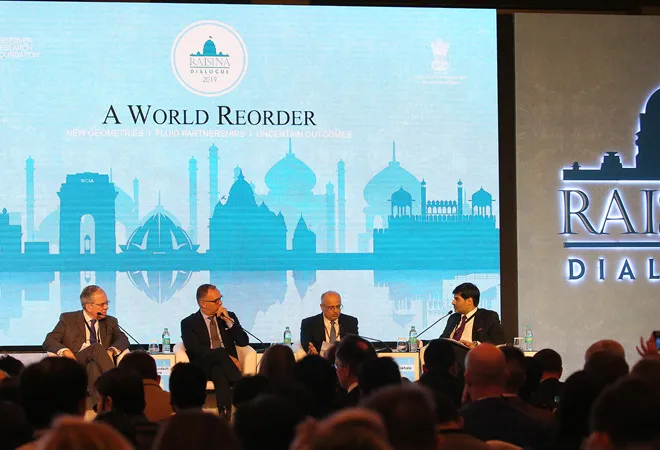-
CENTRES
Progammes & Centres
Location

Today, a United Nations tribunal at Haque will pronounce verdict on a submission by the Philippines questioning the validity of China's nine-dash line claims in the South China Sea (SCS). The contentious issue has raised tensions, even as the US and China have sought to increase their naval presence in the region. This analysis seeks to clarify salient aspects of the disputes, the legal strategies adopted by China and Philippines and likely impact of the final verdict on the balance of power in maritime-Asia. Read more >>
 < style="color: #0069a6;">India and the South China Sea dispute | Abhijit Singh
< style="color: #0069a6;">India and the South China Sea dispute | Abhijit SinghThe South China Sea is witnessing a dramatic rise in maritime tensions. Last week, China landed two fighter jets on Woody Island - a sunset of the Paracel group of islands - just days after the PLA placed, surface-to-air missions at the same location. Read more >>
 < style="color: #0069a6;">Modi's Africa visit: The 'Blue-Economy' imperative | Abhijit Singh
< style="color: #0069a6;">Modi's Africa visit: The 'Blue-Economy' imperative | Abhijit SinghAs Prime Minister Narendra Modi visits Africa, New Delhi's nautical stakes in the African subcontinent have never seemed more stark. In the past few years, it has become clear that for India to be a successful security provider in the Indian Ocean Region, the naval effort in securing the littorals must be complemented by a suitable geo-economic strategy. Read more >>
 < style="color: #0069a6;">Sense of urgency over South China Sea explains PM Modi's US visit | Manoj Joshi
< style="color: #0069a6;">Sense of urgency over South China Sea explains PM Modi's US visit | Manoj JoshiThe importance of the Modi's visit stems from the sense of urgency the US has on the rapidly deteriorating situation in the South China Sea. Read more >>

A tribunal of the Permanent Court of Arbitration in the Hague is ready to give its verdict on a complaint by the Philippines, had challenged China's territorial rights in the South China Sea. Read more >>
 < style="color: #0069a6;">What "excessive maritime claims" is the US challenging India over? | Manoj Joshi
< style="color: #0069a6;">What "excessive maritime claims" is the US challenging India over? | Manoj JoshiIn 2015, India again fell into the category of countries whose claims had been challenged 'multiple times' for the "excessive claims" of requiring countries to seek prior consent for military exercises and manoeuvres in its exclusive economic zone (EEZ). Read more >>
 < style="color: #0069a6;">Games navies play: Anti-access and area denial in maritime Asia | Abhijit Singh
< style="color: #0069a6;">Games navies play: Anti-access and area denial in maritime Asia | Abhijit SinghIndia has so far not made any major investments in improving its submarine detection capabilities. If it can install a deterrence system and operate it with a degree of competence , it could retain its strategic primacy in the Indian Ocean. Read more >>
 < style="color: #0069a6;">RIC and South China Sea | Rajeswari Pillai Rajagopalan and Sylvia Mishra
< style="color: #0069a6;">RIC and South China Sea | Rajeswari Pillai Rajagopalan and Sylvia MishraWhile the RIC statement does not see a shift in India's approach, the fact that China acknowledges the role of UNCLOS in resolving the South China Sea dispute is a step in the right direction. Read more >>
 < style="color: #0069a6;">Can SHADE success story to applied to Southeast Asia | P. K. Ghosh
< style="color: #0069a6;">Can SHADE success story to applied to Southeast Asia | P. K. GhoshThe increased dependency on and density of the shipping trade has fuelled the rise of maritime crime around the globe. Threats such as piracy, maritime terrorism, drug trafficking and gun running have become more potent and given rise to strident calls for effective law enforcement and maintenance of maritime order. Read more >>
 < style="color: #0069a6;">India's maritime stakes in the South Asian littoral | Abhijit Singh
< style="color: #0069a6;">India's maritime stakes in the South Asian littoral | Abhijit SinghIndia's widening spectrum of maritime operations and partnerships should be viewed in the context of South Asia's evolving maritime politics. More frequent deployments in the regional commons and the improving maritime relations with the United States are all signs that New Delhi is willing to act creatively to protect its regional equities. Read more >>
 < style="color: #0069a6;">Military build-up in the Indian Ocean: Implications for regional stability | Rajeswari Pillai Rajagopalan and Arka Biswas
< style="color: #0069a6;">Military build-up in the Indian Ocean: Implications for regional stability | Rajeswari Pillai Rajagopalan and Arka BiswasAs the Indian Ocean region increasingly becomes a more important geopolitical space, global powers and smaller states are laying down their stakes. This paper examines the military build-up of major Indian Ocean powers and examines the implications on the overall balance of power in the region. Read more >>
 < style="color: #0069a6;">India's "undersea wall" in the eastern Indian Ocean | Abhijit Singh
< style="color: #0069a6;">India's "undersea wall" in the eastern Indian Ocean | Abhijit SinghIs India planning to install undersea surveillance sensors in the Bay of Bengal? It is a question that has animated discussions in maritime circles recently. Read more >>
 < style="color: #0069a6;">India and Japan : Reconnecting in the Bay of Bengal | Vindu Mai Chotani
< style="color: #0069a6;">India and Japan : Reconnecting in the Bay of Bengal | Vindu Mai ChotaniThe Bay of Bengal serves as an important transit zone between the Indian and Pacific Oceans, and is home to important Sea Lines of Communication ( SLOC), a huge amount of trade, and developing middle-income countries, such as Bangladesh, Myanmar,Thailand and Sri Lanka who are all willing and eager to engage with South East Asia and East Asia. Read more >>
The views expressed above belong to the author(s). ORF research and analyses now available on Telegram! Click here to access our curated content — blogs, longforms and interviews.